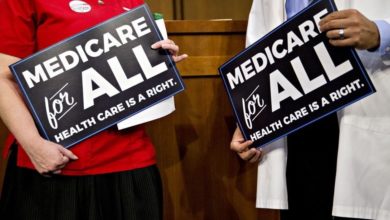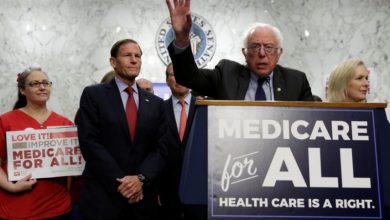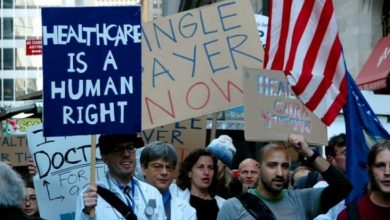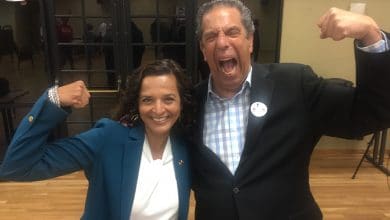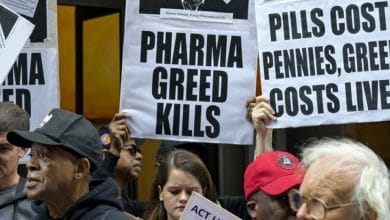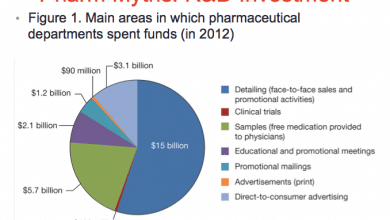Healthcare
So it’s come to this: the US government is threatening countries for standing up to Big Pharma
Colombia’s health minister wanted to make it easier to produce a generic option for hepatitis C treatment. So Big Pharma and Uncle Sam threatened the country’s peace process.

A lot of noise has been made lately about the pharmaceutical industry’s grip on the U.S. government. But not enough has been made about this: for years now, Big Pharma and the government have been threatening other countries with retribution for daring to try to make life-saving meds affordable for their citizens.
The latest battleground is hepatitis C, an illness that kills more Americans than any other infectious disease — despite the fact that a drug exists with a near 100% cure rate. Like murderously expensive HIV drugs in the 1990’s, the hep C treatment has become a global symbol of Big Pharma’s power to put a price on life and death. It has also become a battleground for challenging that power.
From Bogota to Baton Rouge, health officials are making noise about the need to break gold-plated patents on drugs that are cheap to make, born of publicly funded research, and capable of saving millions of lives.
We call them “patents,” but we might as well call them monopolies: exclusive licenses awarded to drug companies that make it illegal for anyone to manufacture a generic version of a given drug. Big Pharma has perfected the art of extending these monopolies for the tiniest of reasons, like arbitrarily combining two existing drugs into one, or getting FDA permission to sell the drug to kids. This corrupt patent system is one of the primary drivers, if not the primary driver, of the ongoing drug price crisis.
In the U.S., the chance that Alex Azar’s Health and Human Services Department will provide the leadership needed to break these patents — that is, to allow licensing of generic versions of the drugs before the patents expire — is roughly equal to the likelihood of Scott Pruitt’s EPA championing a carbon tax. In other words, close to zero.
But other countries don’t need Alex Azar’s approval. Led by less corporatized health ministries, they are free to challenge patents if they believe breaking it would be in the public interest. And that is exactly what they are doing. From the Netherlands to Chile, from Malaysia to Peru, health officials are agitating to license generic versions of hep C drugs that can run into the six-figures.
As you might imagine, these conversations are taking place to Big Pharma’s great and growing displeasure.
This displeasure in currently on public display in Bogota, where Colombia’s health minister, Alejandro Gaviria, has initiated the process to lower prices and license hep C generics. Gaviria has been on Pharma’s shit-list since 2016, when he slashed the price of the leukemia drug Gleevec, made by the Swiss drug giant Novartis. With both Gleevec and the hep C drugs, Gaviria’s decisions are backed by World Trade Organization rules, which allow countries to disrespect patents on drugs if doing so is in “the public interest.”
Unfortunately for hep C patients in Colombia and elsewhere, Pharma is not moved by citations of WTO rules, or appeals to human rights and social needs. Nor is Pharma just any industry. When they come at you, they come backed by the power of the United States, a superpower with the biggest domestic market in the world. Sovereign states like Colombia may not need Alex Azar’s approval to price and produce drugs, but they also don’t need to make an enemy of Washington.
Washington delivered this message with some force during the 2016 Gleevec dispute. The U.S. ambassador in Bogota and Vice President Joe Biden both told the government (and the Colombian people, on national television) that the Obama administration shared the drug industry’s grave concern over the precedent of unilaterally lowering the price of Gleevec (a World Health Organization “essential drug”).
In D.C., staffers from the offices of Senators and the U.S. Trade Representative warned the Colombian embassy that meddling with drug company monopolies risked promised U.S. support for a major ongoing peace process. They also delivered a thinly veiled threat about the power of Pharma, through its powerful influence on U.S. politics, to make life hell for Colombia in a whole host of other areas. As reported by the health news site STAT, a Colombian embassy official in Washington reported back to Bogota:
“Mr. Eissenstat [the U.S. trade official] mentioned that if the Ministry of Health did not correct this situation, the pharmaceutical industry in the United States and related interest groups could become very vocal and interfere with other interests that Colombia could have in the United States.”
Now, with Colombia’s health minister making noises about hep C drug prices, the industry is again delivering ominous warnings about the many negative consequences awaiting Colombia it if challenges the right to put price tags on life and death. They have been especially pointed about Bogota’s pending application to join the Organization for Economic Cooperation and Development, an association of nations that, among other things, promotes its members’ economic welfare.
Jamie Love has been watching bullying scenes like this around the world for a long time. As the executive director of Knowledge Ecology International, a group that advocates for drug access and investigates connections between private industry and governments, Love has seen up close how Pharma and U.S. officials try to scare and punish governments who dare try to set precedents for challenging the industry’s power. He was also deeply involved in negotiating the “Doha rules,” rules adopted in 2001 by the World Trade Organization at Doha, Qatar, which provide signatory governments like Colombia leeway to slash drug prices and license generics.
Other98 spoke with Love by phone about what the industry is up to around the world, and why it’s so threatened by countries breaking patents to save the lives of their citizens.
How common is it for the U.S. government to apply pressure on behalf of Pharma, as it is now in response to Colombia’s plan to bring cheap generic hep C drugs to market?
It’s neither new nor limited to Latin America. The industry has been doing this for decades in every country where they do business. They do it in wealthy countries; they do it in very poor countries. I just got off the phone today with someone in Norway about the pressure the industry is exerting there on the government. In the Philippines, in Chile — it’s happening all around the world.
What are some other forms of pressure that has been brought to bear against countries on behalf of Pharma?
I don’t think people realize how diverse these pressures can be. The United States is the biggest market in the world, the biggest funder of HIV treatment in poor countries. We’re a nuclear superpower, we wield influence in multilateral, plurilateral and regional organizations; if you’re a small Eastern European country, you may worry about being invaded by the Russians. There are so many areas where the United States policies can matter.
In the case of Colombia, right now you see drug companies linking [the country’s efforts to bring down prices] to Bogota’s application to join the OECD. Next, it could be tariffs and quotas — someone from the Dominican Republic was telling me recently how even small changes in sugar and textiles tariffs and quotas can throw a lot of people out of work in that country. When I was involved in a dispute in the 1990s, when the United States was trying to block the passage of the South Africa Medicines Act, the Clinton Administration threatened to bring a steel dumping case against South Africa, if they adopted and implemented the law.
The U.S. can be very devious, and personal, during these negotiations. In one South American negotiation, the U.S. reportedly revoked the student visas of children of trade officials they considered too critical of drug company interests. Pharma also works through the U.S. government to get people fired from government jobs, both in the U.S. and in other countries.
In 2006, when Pfizer sued the health department of the Philippines, they went after two officials in their personal capacity. Pfizer was happy the case received heavy media coverage in the region. Like a bully beating somebody up and leaving lots of evidence, so people will know not to fuck with them. The Pfizer CEO, Hank McKinnell, was sending a warning to other countries in the region.
Does it matter which party controls the White House?
What’s happening in Colombia is despicable but unfortunately not unique to this administration or any party.
Regardless of who is in power, Pharma has been able to behave in the same way with roughly similar expectations of support from the executive branch. You see plenty of Democrats supporting this kind of pressure. The Obama administration played a similar role in 2016 when Colombia announced its intention to allow for the manufacture of a generic version of the cancer drug Gleevec, and before that, to issue a directive on the registration of biosimilar drugs. Vice President Biden pressured the government on the biosimilar directive, and in the Gleevec case, the U.S. ambassador in Bogota even went on television, to head off the generic action. According to people in the Colombian government, some U.S. members of Congress had linked the resolution of the Gleevec dispute to U.S. support and funding for the peace process with the Revolutionary Armed Forces of Colombia (Farc).
That all occurred under President Obama. With Trump, well, his chief secretary, Rob Porter, used to work in the office of Orrin Hatch, a hardline Pharma ally. Porter once actually told MSF/Doctors Without Borders that their drug access campaign was killing people by trying to weaken patent rights.
How much of this is about the actual profits of a specific drug, like Gleevec, and how much is more about the fear of letting countries set a precedent?
The drug companies are often more worried about the precedent, particularly when sales revenue for a particular drug are not significant to the company. As far as the United States is concerned, it doesn’t have to be a new drug or even a U.S. company for the government to get involved. In the case of Colombia and Gleevec, it was a Swiss company and a drug that had already lost its patent protection in the United States, and which had already generated over $50 billion in revenue for Novartis.
One thing in the background of all this, something a lot of people may not realize, is that Pharma continues to try and block generic competition even after a patent expires. How do they accomplish that?
The industry is creative in finding ways to keep charging the price they want. Their basic position is, they should have a monopoly on a product for as long as they can make it happen.
So they’ll start with whatever the patent life might be. Then, when it expires, they’ll get “secondary status” patent extensions. They’ll get rights to “non-patent exclusivities” for things like data and research. With biologic drugs, the companies just have say that the “new” version is different, even though they have only slightly tweaked the original formula. It’s not very expensive to do, and it forces generic competitors to do all their own clinical trials from the beginning, which is expensive and can take years.
On the other hand, the World Trade Organization’s Doha rules actually seem to be pretty favorable to countries seeking to issue generic licenses. Did Pharma let that happen because they weren’t worried about following them?
I think it’s fair to say they’re favorable. But Pharma lobbied very hard for changes during the Doha negotiations in 2001 — they just didn’t get them. The Pharma CEOs were calling U.S. negotiators several times a day. I was in Doha. It was very tense. But Pharma lost, and those rules are now U.S. trade law.
The WTO rules are not ideal, though. They are still pro-Pharma in some areas, and they force all but the least developed countries to grant product-patents. But the WTO rules don’t go as far as Pharma wants. And with Pharma, whatever they got yesterday, they always want something new today. They never rest on their laurels.
Officially the public interest safeguards are there, they are just ignored. In the WTO agreement you have safeguards to protect public health. But then when countries try and use the safeguards, they’re blocked by non-legal means — that is, not by the official dispute resolution, but by political means.
A State Department official explained it to me in blunt terms once during a conversation in Geneva. The United States is an important country with a lot of power, he said, and we will use all of our the resources to achieve our objectives.
And if the U.S.’s objectives just so happen to align perfectly with Big Pharma’s, well… just call that a wild and crazy coincidence.
This piece is part of the Drug Prices are Too High series, sponsored by Social Security Works. If you want to take on Big Pharma and lower drug prices, sign our petition here.

